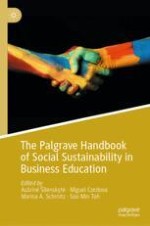2024 | OriginalPaper | Chapter
25. Using the Theory of Planned Behavior to Develop Business Students into Capable Change Agents for Socially Sustainable Development
Authors : Ananya Bhattacharya, Wee Chan Au, Glen Croy
Published in: The Palgrave Handbook of Social Sustainability in Business Education
Publisher: Springer Nature Switzerland
Activate our intelligent search to find suitable subject content or patents.
Select sections of text to find matching patents with Artificial Intelligence. powered by
Select sections of text to find additional relevant content using AI-assisted search. powered by
